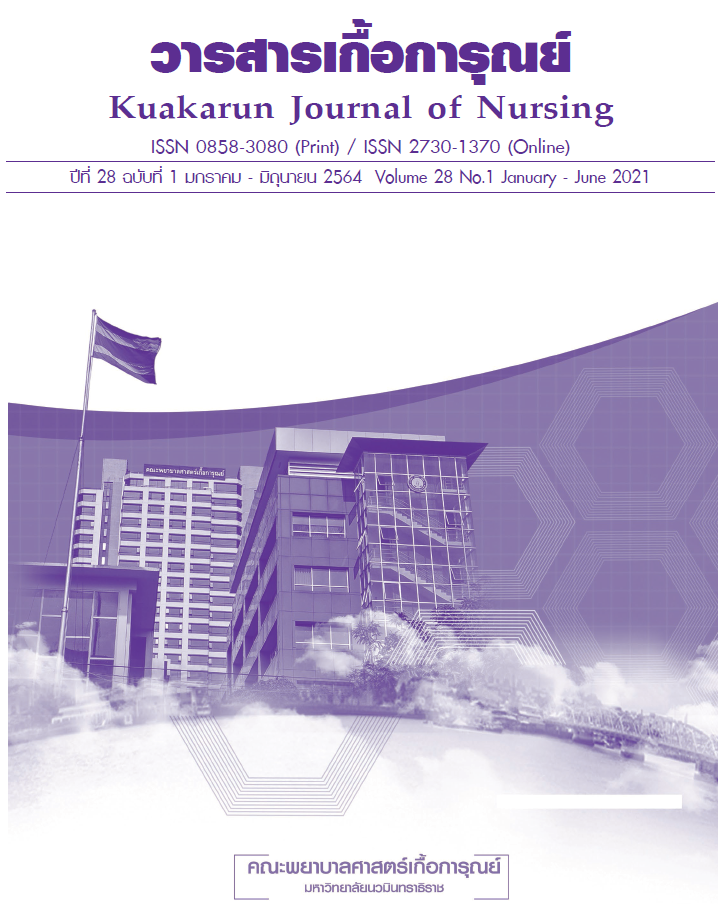ปัจจัยทำนายพฤติกรรมสุขภาพของครูโรงเรียนประถมศึกษา
คำสำคัญ:
ความรอบรู้ด้านสุขภาพ, พฤติกรรมสุขภาพ, พรีซีด-โพรซีด, ครูบทคัดย่อ
การวิจัยเชิงพรรณนาแบบการศึกษาเชิงทำนายนี้ มีวัตถุประสงค์เพื่อศึกษาพฤติกรรมสุขภาพ และปัจจัยทำนายพฤติกรรมสุขภาพของครูประถมศึกษา โดยใช้ พรีซี - โพรซีด เป็นกรอบแนวคิด กลุ่มตัวอย่าง คือ ครูประถมศึกษา คัดเลือกโดยการสุ่มกลุ่มตัวอย่างจากโรงเรียนสังกัดสำนักงานคณะกรรมการการศึกษาขั้นพื้นฐาน อำเภอเมือง จังหวัดนครปฐม จำนวน 300 คน เก็บรวบรวมข้อมูล โดยแบบสอบถามด้วยตนเอง เครื่องมือผ่านการตรวจสอบความตรงและความเที่ยง โดยมีแบบสอบถาม 4 ชุด ได้แก่ 1) แบบสอบถามปัจจัยส่วนบุคคล 2) ความรอบรู้ด้านสุขภาพ 3) การสนับสนุนจากครอบครัว เพื่อนร่วมงาน และผู้บังคับบัญชา 4) พฤติกรรมสุขภาพ ผ่านการตรวจสอบความตรงตามเนื้อหา โดยผู้ทรงคุณวุฒิ 3 ท่าน มีค่าดัชนีความตรงตามเนื้อหาอยู่ระหว่าง .93 - 1.00 ค่าความเชื่อมั่นอยู่ระหว่าง .84 - .96 วิเคราะห์ข้อมูลโดยใช้สถิติเชิงพรรณนา สถิติไคสแควร์ สหสัมพันธ์ของเพียร์สัน และสหสัมพันธ์ของสเปียร์แมน
ผลการศึกษา พบว่า พฤติกรรมสุขภาพโดยรวมและรายด้านอยู่ในระดับปานกลาง ( = 104.66, S.D = 13.29) ความรอบรู้ด้านสุขภาพโดยรวมและรายด้านอยู่ในระดับปานกลาง (
= 85.26, S.D = 13.45) และการศึกษาปัจจัยทำนาย พบว่า ปัจจัยนำ ได้แก่ ความรอบรู้ด้านสุขภาพ (β = .47) ปัจจัยเสริม ได้แก่ การสนับสนุนจากครอบครัว เพื่อนร่วมงาน และผู้บังคับบัญชา (β = .35) และปัจจัยเอื้อ ได้แก่ สถานที่ออกกำลังกายบริเวณบ้าน (β = .14) สามารถร่วมกันทำนายพฤติกรรมสุขภาพของครูได้ ร้อยละ 50.00 (R2adj = .50) การศึกษาครั้งนี้พยาบาลเวชปฏิบัติชุมชนควรนำข้อมูลที่ได้ไปใช้ ในการวางแผนจัดโปรแกรมส่งเสริมความรอบรู้ด้านสุขภาพ การส่งเสริมให้ครูมีการออกกำลังกายที่บ้าน และส่งเสริมให้ครูได้รับการสนับสนุนด้านสุขภาพจากครอบครัว เพื่อนร่วมงาน รวมทั้งผู้บังคับบัญชา เพื่อให้ครูมีพฤติกรรมสุขภาพที่ดี และเป็นแบบอย่างที่ดีให้กับนักเรียนและสังคมต่อไป
เอกสารอ้างอิง
World Health Organization. WHO to establish high-level commission on noncommunicable diseases [Internet]. 2017 [cited 2019 May 15]. Available from: https://www.who.int/news/item/10-10-2017-who-to-establish-high-level-commission-on-noncommunicable-diseases
Institute for Population and Social Research, Mahidol University. Thai health 2014. Bangkok: Amarin Printing and Publishing Public Company Limited; 2014. (in Thai)
Health Systems Research Institute. Thai national health examination survey. Bangkok: Aksorn Graphic and Design Publishing House LP; 2016. (in Thai)
Nutbeam D. The evolving concept of health literacy. Social Science & Medicine 2008;67(12):2072-8.
Intarakamhang U. Health literacy: measurement and development. Bangkok: Behavioral Science Research Institute (BSRI); 2017. (in Thai)
Ginggeaw S, Prasertsri N. The relationship between health literacy and health behaviors among older adults who have multi-morbidity. Nursing Journal of the Ministry of Public Health 2016;25(3):43-54. (in Thai)
Health Systems Research Institute. Review of situations and mechanisms for managing dispersal health [Internet]. 2015 [cited 2019 May 2]. Available from: https://kb.hsri.or.th/dspace/bitstream/handle/11228/4291/hs2172.pdf?sequence=4&isAllowed
Munsaweangsub C, Taechaboonsermsuk P, Pitikultang S, Nanthamongkolchai S. Family health. Bangkok: Prayoonsanthai Printing Limited Partnership; 2016. (in Thai)
Jehtae S, Prateepko T, Lateh A. Factors influencing health promoting behaviors of teachers under the supervision of the primary educational service area, Pattani Province. Journal of Education Prince of Songkla University 2018;29(2):113-22. (in Thai)
Srisodsaluk P. The factors influencing health promoting behaviors of nurse instructors under the central network nursing college of Ministry of Public Health [Dissertation]. Christian Univesity of Thailand; 2014. (in Thai)
Klinaruenart K, Auemaneekul N, Rawiworrakul T, Silpasuwan P. The application of protection motivation theory for coronary artery prevention program for Teachers. Siriraj Nursing Journal 2014;7(2):39-51. (in Thai)
Green LW, Kreuter MW. Health program planning: an educational and ecological approach. 4th ed. New York: McGraw-Hill; 2005.
Lakhiao A, Chaleekrua T. Health literacy and factors related to medication among patients with hypertension Ban Piang Luang Subdistrict health promoting hospital, Chiang Mai Province. Thai Journal of Science and Technology 2015;1(6):635-49. (in Thai)
Yokokawa H, Fukuda H, Yuasa M, Sanada H, Hisaoka T, Naito T. Association between health literacy and metabolic syndrome or healthy lifestyle characteristics among community-dwelling Japanese people. Diabetology & Metabolic Syndrome 2016;8(30):1-9.
Mutasin K. Self-health care behavior of diabetics mellitus patients Bang Nam Priao district, Chachoengsao province. Journal of Rajanagarindra 2016;13(29):213-22. (in Thai)
Suesat P, Tansakul S, Therawiwat M, Imame N. Health-promoting behaviors of secondary secondary school teachers, Surin province. Thai Journal of Health Education 2013;36(125):86-101. (in Thai)

















